- Home
- Richard Powers
The Time of Our Singing
The Time of Our Singing Read online
Table of Contents
Title Page
DECEMBER 1961
WINTER, AROUND 1950
MY BROTHER’S FACE
EASTER, 1939
MY BROTHER AS THE STUDENT PRINCE
MY BROTHER AS HÄNSEL
IN TRUTINA
LATE 1843 – EARLY 1985
A TEMPO
AUGUST 1955
MY BROTHER AS AENEAS
APRIL – MAY 1939
BIST DU BEI MIR
SPRING 1949
MY BROTHER AS ORPHEUS
NOT EXACTLY ONE OF US
MY BROTHER AS OTELLO
AUGUST 1963
SPRING 1940 – WINTER 1941
DECEMBER 1964
MY BROTHER AS FAUST
SUMMER 1941 – FALL 1944
MY BROTHER AS LOGE
AUGUST 1945
SONGS OF A WAYFARER
AUTUMN 1945
DON GIOVANNI
NOVEMBER 1945 – AUGUST 1953
MEISTERSINGER
THE VISITATION
DEEP RIVER
REQUIEM
THEE
ALSO BY RICHARD POWERS
Additional Acclaim for The Time of Our Singing
Copyright Page
DECEMBER 1961
In some empty hall, my brother is still singing. His voice hasn’t dampened yet. Not altogether. The rooms where he sang still hold an impression, their walls dimpled with his sound, awaiting some future phonograph capable of replaying them.
My brother Jonah stands fixed, leaning against a piano. He’s just twenty. The sixties have only begun. The country still dozes in its last pretended innocence. No one has heard of Jonah Strom but our family, what’s left of it. We’ve come to Durham, North Carolina, the old music building at Duke. He has made it to the finals of a national vocal competition he’ll later deny ever having entered. Jonah stands alone, just right of center stage. My brother towers in place, listing a little, backing up into the crook of the grand piano, his only safety. He curls forward, the scroll on a reticent cello. Left hand steadies him against the piano edge, while right hand cups in front of him, holding some letter, now oddly lost. He grins at the odds against being here, breathes in, and sings.
One moment, the Erl-King is hunched on my brother’s shoulder, whispering a blessed death. In the next, a trapdoor opens up in the air and my brother is elsewhere, teasing out Dowland of all things, a bit of ravishing sass for this stunned lieder crowd, who can’t grasp the web that slips over them:
Time stands still with gazing on her face,
Stand still and gaze for minutes, hours, and years to her give place.
All other things shall change, but she remains the same,
Till heavens changed have their course and time hath lost his name.
Two stanzas, and his tune is done. Silence hangs over the hall. It drifts above the seats like a balloon across the horizon. For two downbeats, even breathing is a crime. Then there’s no surviving this surprise except by applauding it away. The noisy gratitude of hands starts time up again, sending the dart to its target and my brother on to the things that will finish him.
This is how I see him, although he’ll live another third of a century. This is the moment when the world first finds him out, the night I hear where his voice is headed. I’m up onstage, too, at the battered Steinway with its caramel action. I accompany him, trying to keep up, trying not to listen to that siren voice that says, Stop your fingers, crash your boat on the reef of keys, and die in peace.
Though I make no fatal fumbles, that night is not my proudest as a musician. After the concert, I’ll ask my brother again to let me go, to find an accompanist who can do him justice. And again he’ll refuse. “I already have one, Joey.”
I’m there, up onstage with him. But at the same time, I’m down in the hall, in the place I always sit at concerts: eight rows back, just inside the left aisle. I sit where I can see my own fingers moving, where I can study my brother’s face—close enough to see everything, but far enough to survive seeing.
Stage fright ought to paralyze us. Backstage is a single bleeding ulcer. Performers who’ve spent their whole youth training for this moment now prepare to spend their old age explaining why it didn’t go as planned. The hall fills with venom and envy, families who’ve traveled hundreds of miles to see their lives’ pride reduced to runner-up. My brother alone is fearless. He has already paid. This public contest has nothing to do with music. Music means those years of harmonizing together, still in the shell of our family, before that shell broke open and burned. Jonah glides through the backstage fright, the dressing rooms full of well-bred nausea, on a cloud, as though through a dress rehearsal for a performance already canceled. Onstage, against this sea of panic, his calm electrifies. The drape of his hand on the piano’s black enamel ravishes his listeners, the essence of his sound before he even makes one.
I see him on this night of his first open triumph, from four decades on. He still has that softness around his eyes that later life will crack and line. His jaw quakes a little on Dowland’s quarter notes, but the notes do not. He drops his head toward his right shoulder as he lifts to the high C, shrinking from his entranced listeners. The face shudders, a look only I can see, from my perch behind the piano. The broken-ridged bridge of his nose, his bruised brown lips, the two bumps of bone riding his eyes: almost my own face, but keener, a year older, a shade lighter. That breakaway shade: the public record of our family’s private crime.
My brother sings to save the good and make the wicked take their own lives. At twenty, he’s already intimate with both. This is the source of his resonance, the sound that holds his audience stilled for a few stopped seconds before they can bring themselves to clap. In the soar of that voice, they hear the rift it floats over.
The year is a snowy black-and-white signal coming in on rabbit ears. The world of our childhood—the A-rationing, radio-fed world pitched in that final war against evil—falls away into a Kodak tableau. A man has flown in space. Astronomers pick up pulses from starlike objects. Across the globe, the United States draws to an inside straight. Berlin’s tinderbox is ready to flash at any moment. Southeast Asia smolders, nothing but a curl of smoke coming from the banana leaves. At home, a rash of babies piles up behind the viewing glass of maternity hospitals from Bar Harbor to San Diego. Our hatless boy president plays touch football on the White House lawn. The continent is awash in spies, beatniks, and major appliances. Montgomery hits the fifth year of an impasse that won’t occur to me until five more have passed. And seven hundred unsuspecting people in Durham, North Carolina, disappear, lulled into the granite mountainside opened by Jonah’s sound.
Until this night, no one has heard my brother sing but us. Now the word is out. In the applause, I watch that rust red face waver behind his smile’s hasty barricade. He looks around for an offstage shadow to duck back into, but it’s too late. He breaks into leaky grins and, with one practiced bow, accepts his doom.
They bring us back twice; Jonah has to drag me out the second time. Then the judges call out the winners in each range—three, two, one—as if Duke were Cape Canaveral, this music contest another Mercury launch, and America’s Next Voice another Shepard or Grissom. We stand in the wings, the other tenors forming a ring around Jonah, already hating him and heaping him with praise. I fight the urge to work this group, to assure them my brother is not special, that each performer has sung as well as anyone. The others sneak glances at Jonah, studying his unstudied posture. They go over the strategy, for next time: the panache of Schubert.
Then the left hook of Dowland, striving for that floating sustain above the high A. The thing they can never stand far back enough to see has al
ready swallowed my brother whole.
My brother hangs back against the fly ropes in his concert black, appraising the choicer sopranos. Stands still and gazes. He sings to them, private encores in his mind. Everyone knows he’s won, and Jonah struggles to make it mean nothing. The judges call his name. Invisible people cheer and whistle. He is their victory for democracy, and worse. Jonah turns to me, drawing out the moment. “Joey. Brother. There’s got to be a more honest way to make a living.” He breaks another rule by dragging me onstage with him to collect the trophy. And his first public conquest rushes to join the past.
Afterward, we move through a sea of small delights and epic disappointments. Congratulating lines form up around the winners. In ours, a woman hunched with age touches Jonah’s shoulder, her eyes damp. My brother amazes me, extending his performance, as if he’s really the ethereal creature she mistakes him for. “Sing forever,” she says, until her caretaker whisks her off. A few well-wishers behind her, a ramrod retired colonel twitches. His face is a hostile muddle, duped in a way he can’t dope out. I feel the man’s righteousness, well before he reaches us, the rage we repeatedly provoke in his people simply by appearing in public. He waits out his moment in the queue, his anger’s fuse shortening with this line. Reaching the front, he charges. I know what he’ll say before he gets it out. He studies my brother’s face like a thwarted anthropologist. “What exactly are you boys?”
The question we grew up on. The question no Strom ever figured out how to read, let alone answer. As often as I’ve heard it, I still seize up. Jonah and I don’t even bother to exchange looks. We’re old hands at annihilation. I make some motions, ready to smooth over the misunderstanding. But the man backs me off with a look that chases me from adolescence for good.
Jonah has his answer; I have mine. But he’s the one in the spotlight. My brother inhales, as if we’re still onstage, the smallest grace note of breath that would lead me into the downbeat. For a semiquaver, he’s about to launch into “Fremd bin ich eingezogen.” Instead, he pitches his reply, buffo-style, up into comic head tones:
“I am my mammy’s ae bairn,
Wi’ unco folk I weary, Sir …”
His first full night of adulthood, but still a child, giddy with just being named America’s Next Voice. His unaccompanied encore turns heads all around us. Jonah ignores them all. It’s 1961. We’re in a major university town. You can’t string a guy up for high spirits. They haven’t strung up anyone for high spirits in these parts for at least half a dozen years. My brother laughs through the Burns couplet, thinking to leave the colonel sheepish with eight bars of good-natured cheek. The man goes livid. He tenses and puckers, ready to wrestle Jonah to the ground. But the eager line of admirers moves him along, out the stage door, toward what the prophetic look spreading across my brother’s face already knows will be a paralyzing stroke.
At the end of the conga line, our father and sister wait. This is how I see them, too, from the far side of a life. Still ours, still a family. Da grins like the lost immigrant he is. A quarter century in this country, and he still walks around like he’s expecting to be detained. “You pronounciate German like a Polack. Who the hell taught you your vowels? A disgrace. Eine Schande!”
Jonah caps a hand over our father’s mouth. “Shh. Da. For Christ’s sake. Remind me never to take you out in public. ‘Polack’ is an ethnic slur.”
“‘Polack’? You’re crazy. That’s what they’re called, bub.”
“Yeah, bub.” Ruth, our mimic, nails him. Even at sixteen, she’s passed for the man more than once, over the phone. “What the hell else you going to call people from Polackia?”
The crowd flinches again, that look that pretends not to. We’re a moving violation of everything in their creed. But out here in classically trained public, they keep that major-key smile. They push on to the other winners, leaving us, for a last moment, once again our own safe nation. Father and eldest son reel about on the remnants of Schubert still banging about the emptied hall. They lean on each other’s shoulders. “Trust me,” the older one tells the younger. “I’ve known a few Polacks in my day. I almost married one.”
“I could have been a Polack?”
“A near Polack. A counterfactual Polack.”
“A Polack in one of many alternate universes?”
They babble to each other, the shorthand jokes of his profession. Clowning for the one none of us will name this night, the one to whom we offer every note of our contest prize. Ruth stands in the stage footlights, almost auburn, but otherwise the sole keeper of our mother’s features in this world. My mother, the woman my father almost didn’t marry, a woman more and longer American than anyone in this hall tonight.
“You did good, too, Joey,” my little sister makes sure to tell me. “You know. Perfect and all.” I hug her for her lie, and she glows under my grasp, a ready jewel. We wander back to Da and Jonah. Assembled again: the surviving four-fifths of the Strom family chorale.
But Da and Jonah don’t need either of us accompanists. Da has hold of the Erl-King motif, and Jonah thumps along, his three-and-a-half-octave voice dropping into bass to whack at his imitation piano’s left hand. He hums the way he wanted me to play it. The way it ought to be played, in heaven’s headliner series. Ruth and I draw near, despite ourselves, to add the inner lines. People smile as they pass, in pity or shame, some imagined difference. But Jonah is the evening’s rising star, momentarily beyond scorn.
The audience this night will claim they heard him. They’ll tell their children how that chasm opened up, how the floor dropped out of the old Duke concert hall and left them hanging in the vacuum they thought it was music’s job to fill. But the person they’ll recall won’t be my brother. They’ll tell of sitting up in their seats at the first sound of that transmuting voice. But the voice they’ll remember won’t be his.
His growing band of listeners will chase Jonah’s performances, prize his tickets, follow his career even into those last, decoupled years. Connoisseurs will search down his records, mistaking the voice on the disk for his. My brother’s sound could never be recorded. He had a thing against the permanent, a hatred of being fixed that’s audible in every note he ever laid down. He was Orpheus in reverse: Look, forward, and all that you love will disappear.
It’s 1961. Jonah Strom, America’s Next Voice, is twenty. This is how I see him, forty years on, eight years older now than my older brother will ever be. The hall has emptied; my brother still sings. He sings through to the double bar, the tempo falling to nothing as it passes through the fermata’s blackness, a boy singing to a mother who can no longer hear him.
That voice was so pure, it could make heads of state repent. But it sang knowing just what shape rode along behind it. And if any voice could have sent a message back to warn the past and correct the unmade future, it would have been my brother’s.
WINTER, AROUND 1950
But no one ever really knew that voice except his family, singing together on those postwar winter nights, with music their last line of defense against the outside and the encroaching cold. They lived in half of a three-story Jersey freestone house that had weathered over half a century to a chocolate brown, tucked up in the northwest corner of Manhattan, a neglected enclave of mixed, mottled blocks where Hamilton Heights shaded off into Washington Heights. They rented, the immigrant David Strom never trusting the future enough to own anything that wouldn’t fit into a waiting suitcase. Even his appointment in the Physics Department at Columbia seemed a thing so fine, it would certainly be taken away by anti-Semitism, anti-intellectualism, rising randomness, or the inevitable return of the Nazis. That he could afford to rent half a house at all, even in this tidal-pool neighborhood, struck David as beyond luck, given the life he’d already owned.
To Delia, his Philadelphian wife, renting seemed as perennially strange as her husband’s pallid theories. She’d never lived anywhere but the home her parents owned. Yet Delia Daley Strom, too, knew that the world’s relentless pu
rifiers would come after their happiness through any open chink. So she propped up her refugee husband and turned their rented half of the freestone into a fortress. And for pure safety, nothing beat music. Each of the three children shared the same first memory: their parents, singing. Music was their lease, their deed, their eminent domain. Let each voice defeat silence through its own vocation. And the Stroms defeated silence after their own fashion, each evening, together, in great gulps of free-playing chords.
Rambling scraps of song started even before the children were awake. Strains of Barber from the bathroom collided with Carmen coming out of the kitchen. Breakfast found them all humming against one another in polytonal rowdiness. Even once the day’s home schooling started—Delia teaching the reading and writing, David doing the arithmetic before heading down to Morningside to lecture on General Relativity—song drove the lessons. Meter markings taught fractions. Every poem had its tune.
In the afternoon, when Jonah and Joey raced home from forced excursions to that strip of playground adjoining St. Luke’s, they’d find their mother at the spinet with baby Ruth, turning the cramped drawing room into a campsite on the shores of Jordan. Half an hour of trios dissolved into bouts of ritual bickering between the boys over who got first dibs with their mother, alone. The winner set to an hour of glorious piano duets, while the moment’s loser took little Root upstairs for read-alouds or card games without real rules.
Lessons with Delia passed in minutes for the praise-heaped student, while stretching out forever for the one waiting in line. When the excluded boy started calling out finger faults from upstairs, Delia turned those catcalls, too, into a game. She’d have the boys name chords or sustain intervals from the top of the stairs. She’d get them singing rounds—“By the Waters of Babylon”—from opposite ends of the house, each boy weaving his own line around the distant other. When they hit the limits of their boy’s patience, she’d bring them together, one singing, the other playing, with little Root inventing spectral toddler harmonies that strove to join this family’s secret language.

 The Overstory
The Overstory Bewilderment
Bewilderment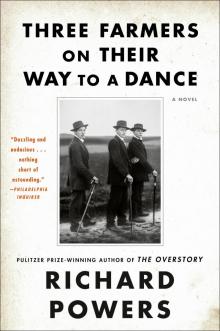 Three Farmers on Their Way to a Dance
Three Farmers on Their Way to a Dance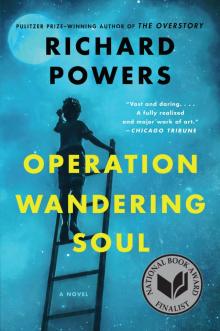 Operation Wandering Soul
Operation Wandering Soul Prisoner's Dilemma
Prisoner's Dilemma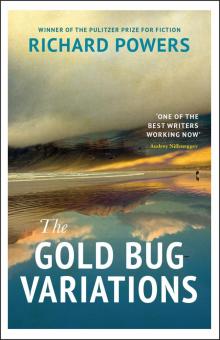 The Gold Bug Variations
The Gold Bug Variations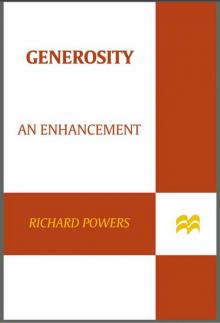 Generosity: An Enhancement
Generosity: An Enhancement The Echo Maker
The Echo Maker Orfeo
Orfeo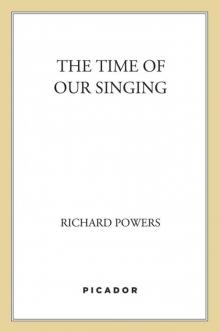 The Time of Our Singing
The Time of Our Singing PLOWING THE DARK
PLOWING THE DARK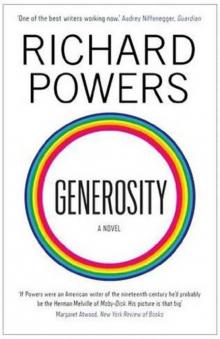 Generosity
Generosity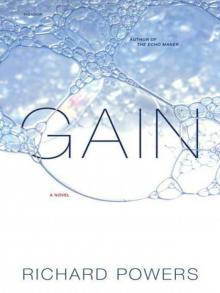 Gain
Gain